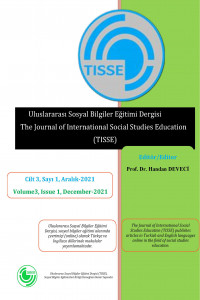Öz
17. yüzyılda yaşayan Jean Jacques Rousseau’un Emile eseri eğitim ile ilgili birçok önemli unsuru barındırmaktadır. Bu eserde özellikle 1. ve 2. kitapların hayat bilgisi dersinin öğretimi konuları ile ilgili olduğu düşünülmektedir. Araştırmanın amacını Jean Jacques Rousseau’nun Emile eserinde hayat bilgisi dersine yönelik düşüncelerinin tespit edilmesi oluşturmaktadır. Bu amaç çerçevesinde araştırmada nitel araştırma yöntemi benimsenmiş ve doküman analizi işe koşulmuştur. Rousseau’nun Emile eserinde hayat bilgisi dersinin amacına yönelik olarak; mutlu birey yetiştirmek (8), çocuğun kendini tanımasını sağlamak (2), hayatı öğretmek (2), iyi insan yetiştirmek (1) ve etkili vatandaş yetiştirmek (1) şeklinde görüşleri tespit edilmiştir. Hayat bilgisi dersinin içeriği ile ilgili olarak; düşünce ve değerler (33), fen bilimleri (12), toplum bilimleri (12), eşya eğitimi (10), doğa, toplum, eşya (9) şeklinde görüşleri belirlenirken “sanat” kategorisine ait herhangi bir görüşe rastlanılmamıştır. Rousseau’nun Emile eserinde hayat bilgisi dersinin içeriğinin oluşturulmasında dikkate alınan unsurlar olan eğitim biliminin özellikleri (122), öğrencinin içinde bulunduğu ortam (13) ve hazırbulunuşluk (4) ile ilgili görüşler tespit edilmiş fakat kazanımlar boyutunda herhangi bir görüş tespit edilmemiştir. Rousseau’nun Emile eserinde hayat bilgisi dersi öğretim ilkelerine yönelik olarak 9 öğretim ilkesi [çocuğa görelik (27), hayatilik (5), temerküz (4), mahallilik (3), ayaniyet (3), bilinenden bilinmeyene (1), somuttan soyuta (1), kolaydan zora (1) ve yakından uzağa (1)] ile ilgili ifadelerin yer aldığı görülmüştür.
Anahtar Kelimeler
Emile hayat bilgisi dersi Jean-Jacques Rousseau Emile, hayat bilgisi dersi, Jean-Jacques Rousseau
Kaynakça
- Yıldırım, A. ve Şimşek, H. (2011). Sosyal bilimlerde nitel araştırma yöntemleri. Ankara: Seçkin.
- Yılmaz, T. (2019). Jean Jacques Rousseau’nun Emile adlı eserinde çocuk, çocuk eğitimi ve ideal vatandaş. (Yayımlanmamış Yüksek Lisans Tezi). Sosyal Bilimler Enstitüsü, Kırşehir Ahi Evran Üniversitesi, Kırşehir.
- Yonah, Y. (1993). The quest for the good life in Rousseau's Emile: An assessment. Studies in philosophy and education, 12, 229-243.
Öz
Jean-Jacques Rousseau, who lived in the 17th century, has many significant elements in his work Emile about education. It has been perceived that the 1st and 2nd books are related to the teaching of life science lessons. The aim of this study is to determine the thoughts of Jean Jacques Rousseau on life science lesson and education in his work Emile. In this context, qualitative research model and document analysis were applied. In his Emile, Jean Jack Rousseau is found to have the following opinions related to the objectives of life science lesson: to raise happy individuals (8), to let the pupils recognize themselves (2), to raise good people (1) and to raise effective citizens (1). With regards to content of the life science lesson, he is found to have opinions related to thoughts and values (33), science (12), social sciences, items education (10), nature, society, items (9) but any “art” category-related opinion is not found. In Rousseau’s Emile, opinions about the characteristics of pedagogy (122), the environment that students are in (13), readiness (4), which are the main elements considered when designing the content of life science lesson, were found while any opinion related to achievements dimension was not found. Rousseau’s Emile is found to employ statements regarding 9 teaching principles related to life science lesson teaching principles [appropriateness for child (27), life-centric (5), integration of disciplines (4), locality (3), meaningfulness (3), from known to unknown (1), from concrete to astract (1), from easy to difficult (1), near-to-far (1).
Anahtar Kelimeler
Kaynakça
- Yıldırım, A. ve Şimşek, H. (2011). Sosyal bilimlerde nitel araştırma yöntemleri. Ankara: Seçkin.
- Yılmaz, T. (2019). Jean Jacques Rousseau’nun Emile adlı eserinde çocuk, çocuk eğitimi ve ideal vatandaş. (Yayımlanmamış Yüksek Lisans Tezi). Sosyal Bilimler Enstitüsü, Kırşehir Ahi Evran Üniversitesi, Kırşehir.
- Yonah, Y. (1993). The quest for the good life in Rousseau's Emile: An assessment. Studies in philosophy and education, 12, 229-243.
Ayrıntılar
| Birincil Dil | Türkçe |
|---|---|
| Konular | Alan Eğitimleri |
| Bölüm | Araştırma Makaleleri |
| Yazarlar | |
| Yayımlanma Tarihi | 30 Aralık 2021 |
| Yayımlandığı Sayı | Yıl 2021 Cilt: 3 Sayı: 1 |

